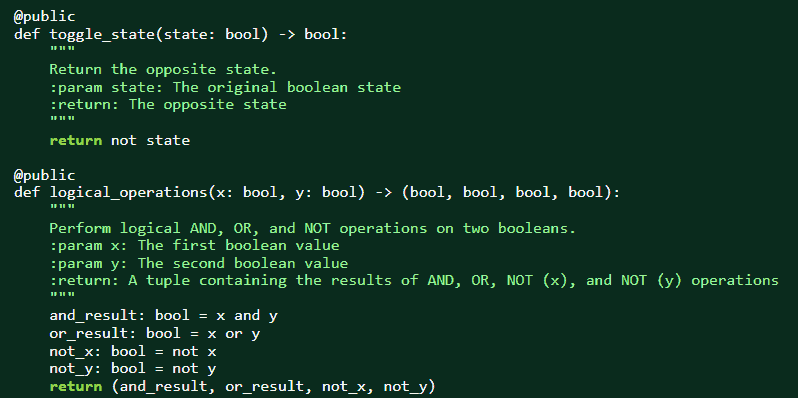A Boolean is a value-type variable in the Vyper programming language which stores a binary value of 1 or 0. Similarly, we think of the variable being either true or false. Here’s an example:
valid_user: bool
@external
def validate_user(status: bool):
self.valid_user = status
@external
def get_validation() -> bool:
return self.valid_user
registration_open: bool
@external
def register():
assert self.registration_open == True, "Registration is currently closed."
eligibility_age: uint256 = 18
has_paid_fee: bool
@external
def check_eligibility(user_age: uint256, user_has_paid_fee: bool) -> bool:
self.has_paid_fee = user_has_paid_fee
return user_age >= self.eligibility_age and self.has_paid_fee
Boolean Function
Let’s start with the basics. The Boolean type, denoted by the bool keyword in Vyper, is the simplest data type and is used to represent truth values.
In computing, and Vyper is no exception, a Boolean variable can only hold one of two values: True or False. These two values are the cornerstone of logical statements and control structures, dictating the flow of your smart contracts.
Consider this simple Vyper smart contract that emulates a light switch:
@public
light_switch: bool
@external
def get_switch() -> bool:
"""
Return the current state of the light switch.
"""
return self.light_switch
@external
def change_switch():
"""
Toggle the state of the light switch.
"""
self.light_switch = not self.light_switch
In this contract, light_switch exemplifies a Boolean in action, being toggled on and off by the change_switch function.
Booleans with Operators
Booleans in Vyper come with operator tools for crafting logical expressions:
notflips the truth valueandrequires both values to be True for the result to be Trueorrequires at least one value to be True for the result to be True==checks if two values are equal!=checks if two values are different
These aren’t just theoretical concepts — they are the decision-makers in your Vyper smart contracts.
Truth with Short-Circuiting
Vyper’s Boolean or and and operators exhibit short-circuiting behavior. This means once an “if” statement returns true, the rest of the code in the conditional is skipped. This performance feature and safety mechanism ensures your logical expressions are as efficient as possible. To highlight this behavior, consider an eligibility check based on age:
@public
is_eligible: bool
@external
def check_eligibility(age: uint256) -> bool:
"""
Determine eligibility based on age.
"""
if age >= 18:
return True
else:
return False
@external
def update_eligibility(age: uint256):
"""
Update the stored eligibility status based on the given age.
"""
self.is_eligible = self.check_eligibility(age)
In this example, we use a condition within check_eligibility and update our state variable is_eligible based on the result, illustrating the use of Booleans for logical decision-making.
Example 1: Storing and Retrieving a Boolean Value
Our first example demonstrates how a Boolean value can be stored and retrieved in a smart contract.
valid_user: bool
@external
def validate_user(status: bool):
# Store a Boolean value in the contract.
self.valid_user = status
@external
def get_validation() -> bool:
# Retrieve the stored Boolean value.
return self.valid_user
In the contract above, a state variable valid_user of type bool is declared. The function validate_user allows the Boolean status of a user to be stored in valid_user. Meanwhile, the get_validation method allows us to retrieve this stored Boolean value.
Example 2: Using Boolean in Conditional Statement
Next, we use a Boolean in a conditional statement to make decisions.
registration_open: bool
@external
def register():
# Register a user only if registration is open.
assert self.registration_open == True, "Registration is currently closed."
In this example, the register function uses an assert statement to ensure that registration is open (i.e., self.registration_open is True) before proceeding with user registration. If self.registration_open is False, the string “Registration is currently closed” is returned.
Example 3: Boolean Operators in Practice
Our last example showcases how Boolean operators and, or, and not can be used in a Vyper contract.
eligibility_age: uint256 = 18
has_paid_fee: bool
@external
def check_eligibility(user_age: uint256, user_has_paid_fee: bool) -> bool:
# Check if a user is eligible.
self.has_paid_fee = user_has_paid_fee
return user_age >= self.eligibility_age and self.has_paid_fee
In this contract, the check_eligibility function takes an age and a Boolean that indicates whether the user has paid the required fee. The function returns True only if the user is of the eligible age and has paid the fee.
Best Practices and Common Pitfalls
While using Boolean data types in Vyper, consider the following best practices and common pitfalls:
- Explicit is Better than Implicit: When making comparisons, be explicit. Instead of writing
if is_valid:orif not is_valid:, writeif is_valid == True:orif is_valid == False:. This style is more readable and less prone to mistakes. - Avoid Redundancy: Don’t compare Boolean variables to
TrueorFalsein conditions. For example, instead of writingif is_valid == True:, you can simply writeif is_valid:. - Order of Logical Operations: Be aware that the logical operations
andandorare short-circuited, meaning that if the first operand of anandoperation isFalse, the second operand won’t be evaluated because the result is definitelyFalse. Similarly, if the first operand of anoroperation isTrue, the second operand won’t be evaluated. While this can sometimes help optimize your code, it may also lead to unexpected behavior if the second operand has side effects.
Remember, Boolean data types play a vital role in controlling the conditional flow of code execution. Thoughtful and effective implementation can often lead to a more secure, understandable, and efficient smart contract.
Best Practices
When using Booleans in Vyper:
- Choose descriptive variable names, like
is_eligibleorhas_balance. - Be explicit;
if is_verified:is clearer thanif is_verified == True:. - Utilize short-circuiting for efficient code; consider the order of your logical operations.
Remember, Booleans are passed by value and immutable, so reassignments won’t affect the original variable.
Booleans in Vyper are simple yet powerful foundational tools. By understanding and utilizing Booleans and their operators, you can create smart contracts that are precise, efficient, and reliable.


